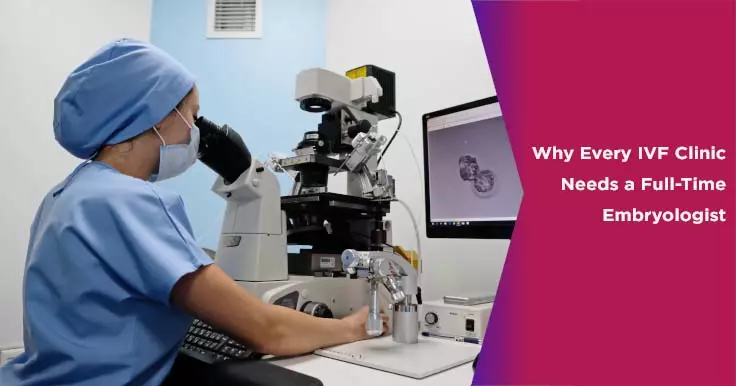What Does an Embryologist Do? Role and Importance in Fertility Treatment

When couples are unable to conceive on their own, they turn to fertility clinics. In many cases, IVF is advised as the best form of fertility treatment for them. This involves extracting healthy eggs and sperm from both parents, using them to create embryos in a lab and then reintroducing them to the uterus. This is a very delicate lab procedure that must be done only by a trained embryologist.
What Does an Embryologist Do?
An embryologist is involved in the egg retrieval, the introduction of sperm to the egg and the embryo transfer. For the egg retrieval, the doctor harvests the follicular fluid containing a viable egg from the ovary and gives it to the embryologist who is responsible for separating the egg from the fluid.
For the creation of the embryo, the embryologist must make very small, delicate movements to help the sperm fertilize the egg. This is known as micromanipulation. During the embryo transfer, it is the embryologist who inserts the embryo into the catheter. Embryologists also play a key role in freezing spare embryos and thawing them for use on a later date.
Full-time vs Part-time Embryologist
Full-time embryologists help doctors give their patient’s better treatment. By spending all their embryologist work hours at one clinic, they can base an IVF procedure on the woman’s natural menstrual cycle and natural sperm availability.
However, in the case of IVF clinics working with part-time embryologists, a lack of time often makes doctors manipulate the menstrual cycle and make men undergo unnecessary complex procedures like TESA. Having a full-time embryologist also allows the clinic to conduct each patient’s IVF cycle individually instead of in batches. This reduces the risk of human error and sample mix-ups.
Hence, if you’re thinking of undergoing an IVF cycle, don’t just look at the clinic’s panel of doctors- also pay attention to the embryologists.
 Infertility Counselling
Infertility Counselling Female Infertility Treatment
Female Infertility Treatment Andrology Treatment
Andrology Treatment Fertility Enhancing Surgeries - Female
Fertility Enhancing Surgeries - Female Fertility Enhancing Surgeries - Male
Fertility Enhancing Surgeries - Male Endoscopy Treatment
Endoscopy Treatment IUI Treatment
IUI Treatment IVF Treatment
IVF Treatment ICSI Treatment
ICSI Treatment Advanced IVF Solutions
Advanced IVF Solutions Embryology
Embryology Vitrification Egg, Embryo, Sperm Freezing
Vitrification Egg, Embryo, Sperm Freezing Preimplantation Genetic Testing (PGT)
Preimplantation Genetic Testing (PGT) Donation Program Embryo / Egg / Sperm
Donation Program Embryo / Egg / Sperm Self-cycleTM IVF
Self-cycleTM IVF

 Self-cycleTM IVF
Self-cycleTM IVF










